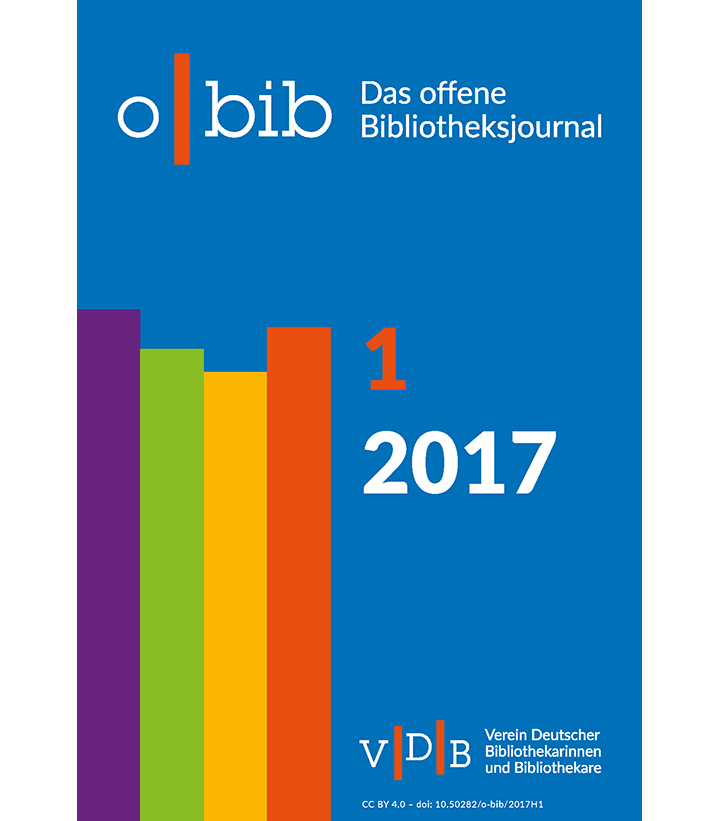Information Literacy Threshold Concepts and the Association of College and Research Libraries' Framework for Information Literacy for Higher Education
DOI:
https://doi.org/10.5282/o-bib/2017H1S1-9Keywords:
Threshold Concepts, ACRL, Framework for Information Literacy for Higher EducationAbstract
The 2014 release of the Association of College and Research Libraries’ Framework for Information Literacy for Higher Education had a significant impact on information literacy scholarship and practice in the United States. The revision process of the previous Competency Standards and the purpose and implementation of the new Framework are still widely discussed as librarians work out what the Framework means to individual institutions and to information literacy as a whole. Organized around six threshold concepts in information literacy as identified in recent research, the Framework reflects developments in the information landscape as threshold concepts have become influential. The authors, who began their research in threshold concepts at the same time as the use and discussion of information literacy threshold concepts increased in the United States, discuss how their work fits into a larger, national conversation on conceptual information literacy instruction and the creation of a high-profile document.
Die Verabschiedung des Framework for Information Literacy for Higher Education der Association of College and Research Libraries 2014 hatte beachtliche Auswirkungen auf Theorie und Praxis der Vermittlung von Informationskompetenz in den USA. Der Überarbeitungsprozess der früheren Standards Informationskompetenz sowie Zielrichtung und Umsetzung des neuen Framework werden nach wie vor breit diskutiert, da Bibliothekar/inn/e/n nun konkretisieren, was das Framework für ihre jeweilige Einrichtung und für Informationskompetenz insgesamt bedeutet. Indem es um sechs threshold concepts gruppiert ist, die die aktuelle Forschung zu Informationskompetenz identifiziert hat, bezieht das Framework gezielt Entwicklungen der Informationslandschaft auf diese richtungsweisenden threshold concepts. Die Autorinnen, die ihre Untersuchungen zu threshold concepts just zu der Zeit begannen, zu der der Einsatz von und die Diskussion um threshold concepts in den USA sich ausweitete, legen dar, wie sich ihre Arbeit in einen landesweiten Diskurs um konzeptionell orientierte Vermittlung von Informationskompetenz und die Erstellung eines von der Öffentlichkeit vielbeachteten Grundlagenpapiers einfügt.
References
Notes
Townsend, Lori, Amy R. Hofer, Silvia Lin Hanick, and Korey Brunetti. “Identifying Threshold Concepts for Information Literacy: A Delphi Study.” Communications in Information Literacy, 10, no. 1 (Jan. 2016): 23. Accessed December 12, 2016, http://www.comminfolit.org/index.php?journal=cil&page=article&op=view&path%5B%5D=v10i1p23&path%5B%5D=228
Information Literacy Competency Standards for Higher Education Task Force. “Framework for Information Literacy for Higher Education, Draft 1, Part 1.” Chicago: Association of College and Research Libraries, February 20, 2014. http://acrl.ala.org/ilstandards/wp-content/uploads/2014/02/Framework-for-IL-for-HE-Draft-1-Part-1.pdf
Bravender, Patricia, Gayle Schaub, and Hazel McClure. Teaching Information Literacy. Threshold Concepts: Lesson Plans for Librarians. Chicago: Association of College and Research Libraries Press, 2015.
American Library Association. Information Literacy Competency Standards for Higher Education. (2000). Chicago: Association of College and Research Libraries. Accessed December 21, 2016. http://www.ala.org/acrl/sites/ala.org.acrl/files/content/standards/standards.pdf
Ibid.
American Library Association. History of the Framework for Information Literacy for Higher Education. “Framework for Information Literacy for Higher Education.” Chicago: Association of College and Research Libraries. http://acrl.ala.org/framework/?page_id=41
Framework, Draft 1, Part 1.
Ibid
American Library Association. “Presidential Committee on Information Literacy. Final Report.” January 10, 1989. Chicago: Association of College and Research Libraries. http://www.ala.org/acrl/publications/whitepapers/presidential
Framework for Information Literacy for Higher Education
ACRL Board of Directors. Update from the ACRL Board of Directors on the Framework for Information Literacy for Higher Education. ACRL Insider, January 15, 2016. http://www.acrl.ala.org/acrlinsider/archives/11232
ACRL Board of Directors. ACRL Board Takes Action on Information Literacy Standards. ACRL Insider, June 25, 2016. http://www.acrl.ala.org/acrlinsider/archives/12126
Witek, Donna. “Framework Spotlight on Scholarship: ‘Teaching for Transfer’ by Kuglitsch.” Framework for Information Literacy for Higher Education, October 14, 2015. http://acrl.ala.org/framework/?p=107
Mader, Sharon. “ACRL Framework for Information Literacy Sandbox Launches.” ACRL Insider, December 8, 2016. http://www.acrl.ala.org/acrlinsider/archives/category/information-literacy
Malenfant, Karen. December 1, 2015. “ACRL Selects New Curriculum Designers/Presenters for the Framework.” ACRL Insider, http://www.acrl.ala.org/acrlinsider/?s=new+curriculum+designers
A current list of professional development toolkits on subjects like diversity, information literacy, and advocacy is available at http://www.ala.org/acrl/proftools/toolkits
Albert Michelle A. and Caroline Sinkinson, "Composing Information Literacy: A Pedagogical Partnership Between Rhet/Comp and Library Faculty" (September 25, 2015). Georgia International Conference on Information Literacy. Paper 24. http://digitalcommons.georgiasouthern.edu/gaintlit/2015/2015/24
Framework for Success in Postsecondary Writing. January 2011. Council of Writing Program Administrators (CWPA), the National Council of Teachers of English (NCTE), and the National Writing Project (NWP). http://wpacouncil.org/files/framework-for-success-postsecondary-writing.pdf
Conahan, Margot. “Updates from the Framework Advisory Board.” ACRL Insider, July 11, 2016. http://www.acrl.ala.org/acrlinsider/archives/12202
Downloads
Published
Issue
Section
License
Copyright (c) 2017 Gayle Schaub, Hazel McClure

This work is licensed under a Creative Commons Attribution 4.0 International License.





